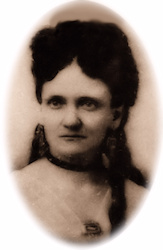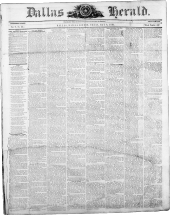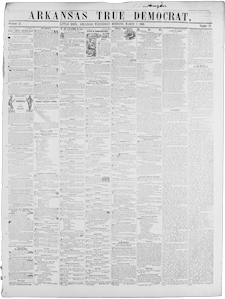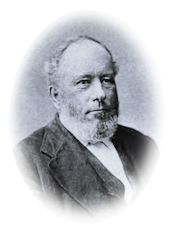April 29, 1863, Savannah Republican (Georgia)
Dismal Swamp, N. C.,
April 21st, 1863.
Mr. Editor:–From the above captain you may judge that we have gone nearly to the “jumping off place.” I never was so near out of the civilized world. But let this dismal region come in at its proper place. I will continue the narration of our expedition in order.
The day I last wrote from Gatesville, and after my letter was sealed, there was enacted, at Col. Cumming’s headquarters, one of the most interesting, comic, and amusing hypodromes recorded in the annals of this war. In the evening, a dozen or more young ladies from Gatesville visited our brigade, paying especial honors to the 20th Georgia. They were neatly and appropriately dressed, and tolerably good looking to boot, but most of them came out in “go-carts”–a vehicle in common use in this region. They went by singing “Wait for the Wagon,” &c., and were heartily cheered by the boys. When they reached Col. Cumming’s headquarters they all descended from their “carriages”, and were entertained by the band and songs by Thad. Murphy–an amusing character who had gained considerable reputation in comic shows and negro minstrelsy. Col. C. was pressed to address them, but declined. The evening passed off pleasantly enough.–When the hour of departure arrived, the young ladies were in the most gallant manner escorted to their “go carts”–some drawn by horses, some by mules, but the greater part, by oxen! One young lady, and a pretty one too, exclaimed “Where’s my carriage?” The “carriage” drove up and wheeled about for her to get in. What do you suppose that “carriage” was? A little two wheeled cart, with a body 3 by 5 feet, and drawn by a little red two year old bull! Now that’s a fact! During our entire trip through northeastern North Carolina, I have not seen but two carriages, a half dozen buggies and three sulkies. But I have seen five hundred go-carts! They are fashionable. But the funniest features of this funny mode of locomotion is that all, male and female, stand up to drive. The first time we saw two girls standing up in one of those two wheeled carts busily plying the whip to the pony between the shafts, there was a universal burst of laughter from all beholders. But they became so common as to create no remark; on the contrary, a buggy or sulky became a matter of some importance, if not of surprise.
The citizens of Gatesville gave an entertainment the same night and invited the brigade. It was intended as a supper and ball; but the jealousy and misguided pride of some gold laced officers broke it up. There was too large an attendance of privates to suit them, and they determined to carry the day. The soldiers seeing what was in the wind, determined to “stick ’em out.” It was little less than a “row”–disgraceful to the brigade. It is understood that brandy was at the bottom of it.
The next day (Saturday) we passed through Gatesville, on our way to the “Block House,” on Chowan river, distant about twenty miles. Numerous Secesh flags hung from the windows, and the children cheered for the “Jeff Davis boys.” Gatesville is rather a pretty town. The Court House is large, and the churches speak favorably for the morals of the people. The streets and walks are well shaded, and, with a little attention, it could be made one of the prettiest towns in the eastern portion of the State.
Fish, eggs, butter, milk, chickens and potatoes were abundant and cheap. Southwestern Georgia cannot surpass this country in the production of potatoes. I never saw finer, sweeter yams. For once I got my “fill” of eggs and shad.
Two or three hours by sun we halted at an old church, near a large swamp, and within two miles of the entrenched camps and block houses of the Buffaloes, but they were gone.–Had we been a day sooner we could have captured the whole possee comitatus. There was one company of Massachusetts men and renegades, numbering about one hundred and fifty. They were in great distress, fearing we would come down upon them before the transport from the Yankee fleet, off Newbern, I suppose, come to their assistance. They are said to have been in despair, and would have surrendered without resistance. But about three o’clock of the morning we reached them, a transport came up the Chowan and carried them off. Before leaving there, they destroyed their block houses.
The Chowan is very wide and deep–capable of floating a vessel of heavy burden. It affords an abundant supply of the choicest shad, rock, mullet, perch and pike. The people are all good livers in this section, and many are wealthy. Mr. Elliott had stolen from him 55 negroes, and I heard of some farmers who have lost from 100 to 400.
This class of citizens have been sorely persecuted by the Buffaloes or renegades. There is a hybrid breed of traitors, called “sawed horned Buffaloes,” because they do not take up arms and engage in open acts of war, but profess to be friends to whichever party happens to be in power. They are said, however, to favor the Yankees most, by informing them of our movements. They bring news to us also, but their tales are not credited.
On the following day the enemy were reported as having crossed the swamps by the turnpike and moving towards Gatesville to get in our rear. In consequence of this report we marched twenty or twenty-two miles by a circuitous route to Sandy Crossing, where we halted for the night. The report was exaggerated, only a small scouting party having appeared at the west end of the pike. At 12 m yesterday we reached the Dismal Swamp turnpike. The 17th regiment was detailed to guard this pike while the rest of the command proceeded with the expedition.
It is useless for me to attempt a description of the swamp or the country in which we are stationed. In the absence of a map, and my ignorance of the geography, or topography, of the country, I am at a loss to understand any thing about it. It is the wildest, strangest country I ever saw. The sun rises in the south and sets in the north! The swamp is dark and dismal, and impassable to every creature but bears, wolves, panthers, et id genus, which are said to be numerous. In many places a man will sink to his neck in the quagmires. The water looks as black as tar; the fish are black; every thing except man is black, and he is swarthy enough. The people are ignorant beyond anything I have seen in the States. I have asked every man (citizen) I met the name of the county, and at last was told by a soldier. He says it is Perquimon county. It ought to have been persimmon county. Possum Scuffle District! Some told me it was Colmmon co.; some McColmmon; some Gates, Aquamine and Pasquotank. It is positively affirmed that some of the people don’t know that there is a Southern Confederacy. One family was very anxious to learn how Gen. George Washington is “getting on with his army!” They have never heard of Lee, Jackson, Longstreet, or Beauregard! In one precinct near the Dismal Swamp the people, it is said, vote for Henry Clay at every election! They think he is running for President. I think there is a slight mistake here. It is Jackson–old Hickory–they vote for. Whigs don’t live in “sich” a swamp. Not one half of the people have ever heard of the battle in front of Richmond–or the last battle of Manassas! This must be the region from which came the honest “tar heels”–the victim and source of so much raillery and jest.
The enemy’s cavalry pickets are two miles in front of us at the toll gate, where the pike turns southward towards South Mills. They destroyed a barn near the gate last night, containing from 300 to 500 barrels of corn. We have one section of artillery, one company of cavalry, and can hold in check a force of ten thousand men.
But I am spinning my narrative to too great a length. Bear with me one moment and I am done for the time.
I know not what direction Gen. Benning will take, nor how long this regiment will remain here.
We are in total ignorance of what is going on at Suffolk. Can hear nothing reliable.
It is reported and believed that the Yankees have evacuated Elizabeth City. We get no papers, and very few letters. If we stay here long we will all become “tar heels” or hoosiers.
More anon. V.A.S.P.











